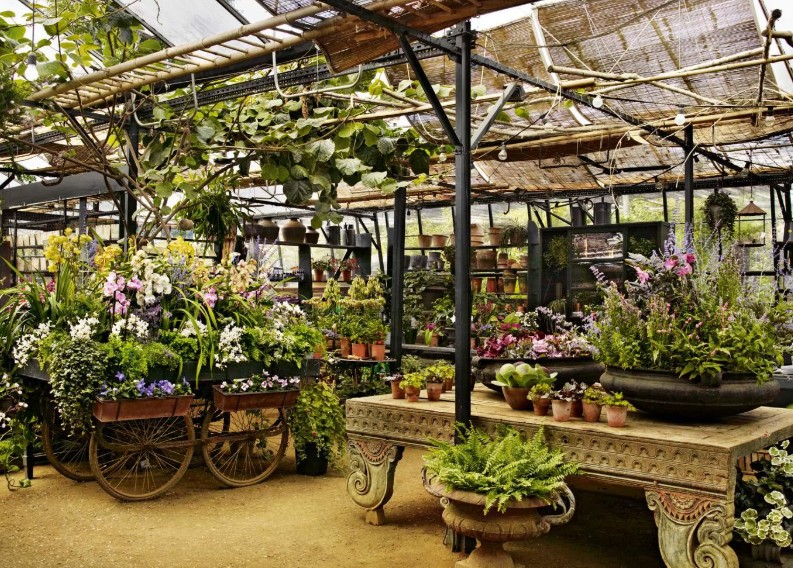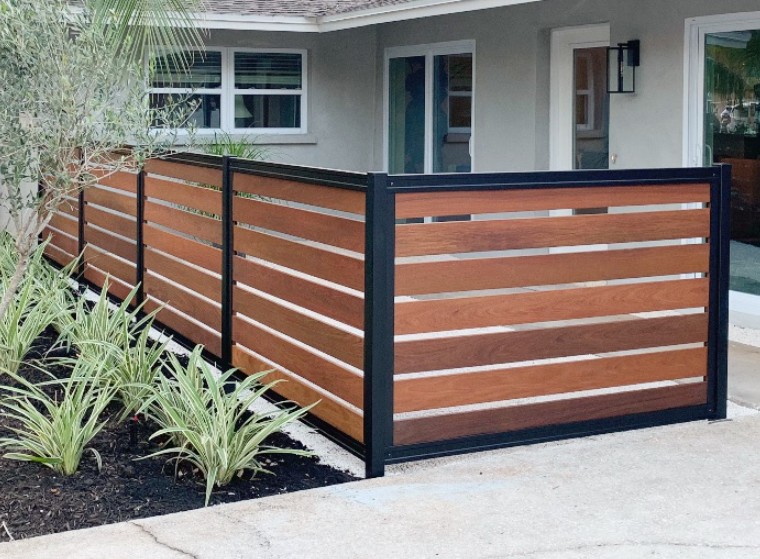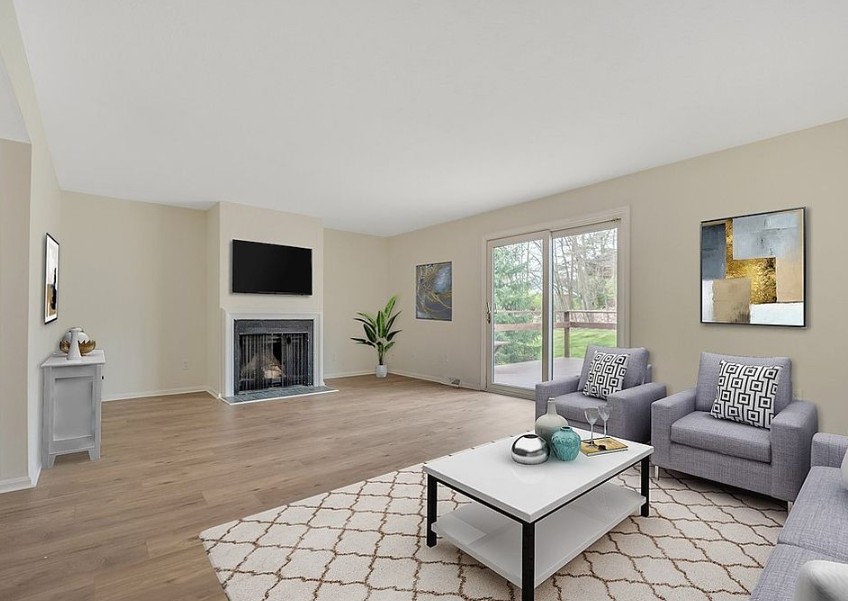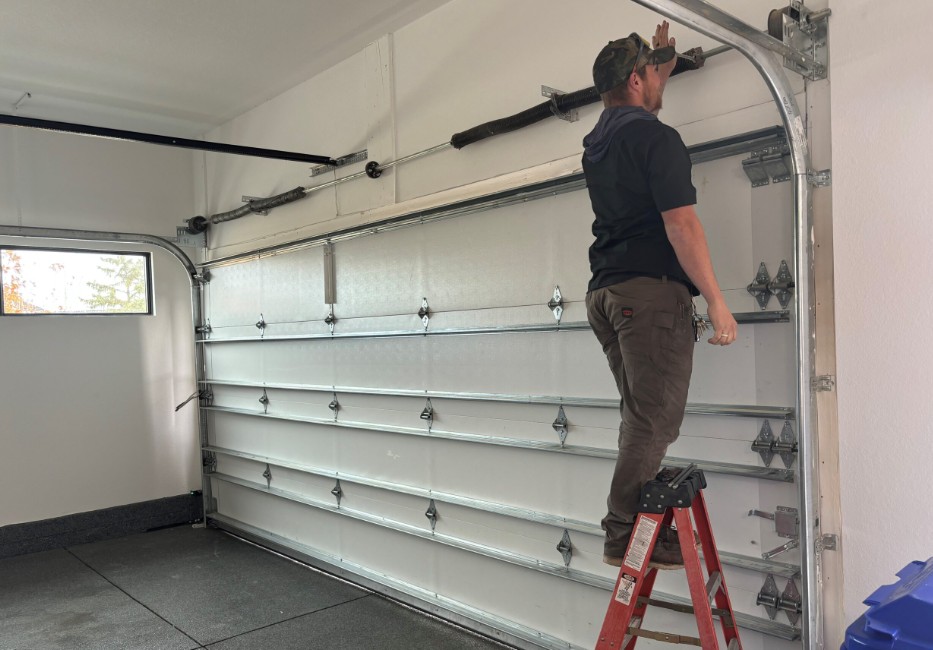A sitting garden blossoms during the pandemic

Nidia Liberato didn’t plan on sharing her garden.
When Liberato, 34, purchased her Lilburn home in August 2019, her yard was an eyesore.
“It was wild. An absolute jungle undeveloped with poison ivy, English ivy, weeds everywhere,” Liberato said.
Today, behind the tree stumps covered in moss and ferns are pathways lined with glass bottles leading to banana trees and a fire pit. Eight chairs and a sign that reads “Future Community Sitting Garden” welcomes neighbors to sit and enjoy the view. In the backyard, you’ll find a vegetable garden, fruit trees, a chicken coop with a few rabbits, a pond with frogs and fish, a reading corner with books and a greenhouse.
Liberato said she didn’t have a solid plan for her 0.85 acre plot of land. At least not until she joined the The Buy Nothing Project of Lilburn in March. The Buy Nothing Project involves hundreds of local “gift economy” Facebook groups, with members exchanging goods or services with neighbors for free.
“Through the pandemic, it was something so, so beautiful because it restored our faith in humanity,” Liberato said. “I’m expanding on that. People have beautiful gardens in the back. I just was like, ‘What if I turn this into a beautiful garden and made it clear that others could walk on?’ I just want to gift it to anyone in the neighborhood. Just come, this is yours too.”
Nearly all of the plants and items in her community sitting garden are donated. It is set to open in Spring 2022. It has been enthusiastically welcomed by neighbors who have donated hundreds of glass bottles, plants, water hoses, and time. But not all are welcoming.
I am a unique case. They have never seen something like this before. They had to redefine what’s allowed in a front garden.” – Nidia Liberato
One nearby resident called Gwinnett County Code Enforcement because she was concerned about the appearance of the garden, which is still under construction. Liberato’s garden has forced the county to assess what is and isn’t allowed in a private front and side yard.
Liberato calls her garden “The Asilo,” which means “asylum” in Spanish. She has three children ages 6, 4 and 3 and describes herself as a stay-at-home mom who loves “bugs, dirt and [to] get muddy” and uses her yard to teach her children about nature.

“I have clinical anxiety and depression, which I take medicine for. It started as this little joke. That’s my little asylum,” Liberato said. “In the winter I would sit out there with a book when my kids would drive me nuts. I would go to the chicken coop and now that name represents the entire garden.”
She said it’s also helped her to meet all of her neighbors and have normal social interactions in a safe way during the pandemic.
Loose Chickens
Code Enforcement officers said they first learned about the garden on June 3, when there was a complaint from a neighbor regarding “glass bottles, windows, doors, tree debris, stumps, and chickens running loose on the property.”
Officers visited the garden on June 7 and left a courtesy notice with code violations such as having chickens too close to the road. However, Liberato said most of the violations listed were not accurate because there was a misunderstanding that she was selling something and money was involved.
“I am a unique case. They have never seen something like this before. They had to redefine what’s allowed in a front garden,” Liberato said. “They know what I’m doing, my goal, and it’s not just junk. Yes, it’s important to stick with the guidelines and I can’t go overboard with too many nutty things, but I appreciated it so much that they were willing to work with me.”
Liberato said she had to scale back her ambitions and moved her chickens, which were close to oncoming traffic, to the backyard. She also removed two sets of doors that were welcome symbols.
“Surely the voices of those who love the project matter. Surely I have some rights as an artist,” Liberato wrote in a June 29 e-mail to officers. “Surely there is just a simple misunderstanding of what the plans I have for the garden [are] and a lack of vision.”
Liberato said there would be “piles of mulch” and gardening equipment scattered around her garden while under construction. She asked the county for protection “from those who have no interest in seeing progress.”
Code enforcement officers were considering whether features of the garden were “visually appealing” when offering their feedback.
“This brings up a new/old PMO (project management office) issue… where do we draw the line at yard art… think I mentioned this at some point during our PMO discussions…We have had others to use tires in their yards and paint them as well as other items you would not expect…,” wrote code enforcement officer Kim Chassion in an e-mail to colleagues on June 29.
After a second site visit on July 29, Gwinnett County Code Enforcement deputy director Chris Hayward sent Liberato a list of seven changes that needed to be made. The email stated only eight chairs are allowed, the broken glass needed to be removed and included a reminder that no goods or services from the garden can be sold.
“Although there is still an open code enforcement case on the property, [Ms. Liberato] has made significant progress toward addressing all outstanding issues,” Hayward wrote in an email to WABE.
Neighbor or Stranger?
Community gardens are typically run by municipalities or non-profits. On them, people lease plots to grow fruits and vegetables. Liberato’s community garden is for neighbors to sit and meet each other and also to feed the chickens and take flowers, herbs, peppers and fruit from the fruit trees.
Timothy Daly is an agricultural and natural resource agent with the Gwinnett County Cooperative Extension office for the University of Georgia. He oversees his church’s community garden and leads forestry, horticulture, landscape management, and water conservation education programs in Gwinnett.
It’s a much more progressive idea that’s likely to be inside the city limits of Atlanta. But sure, there is a place for it here.” – Melody Dunn
He said he thought Liberato’s efforts and intentions were altruistic, but overlooked security concerns.
“I wouldn’t want strangers coming onto my property like that because there’s a lot of issues,” Daly said. “Who are these people? If somebody wants to look at pretty plants is one thing, but how am I going to determine that versus somebody who wants to break in the house?”
Another potential problem with the garden, he said, was safety.
“She is the one ultimately responsible to make sure they’re safe and it will be on her if she has any accidents or injuries potentially.” Daly said.
Liberato said she would look into what her homeowner’s insurance covers before she opens it next Spring, but overall is not concerned about visitors.
“I think it’s kind of a silly way to live, constantly expecting the worst of people,” Liberato said. “I’m not walking into this ignorantly, but at the same time, I’m not going to just … shut the whole thing down because there’s one bad egg out of the hundred thousand.”
Whimsical Lilburn
Jill Dermyer lives across the street from Liberato in the Cedar Creek subdivision. As a psychologist who works from home, she said her office view is the community sitting garden, which she has watched blossom over the past year.
Dermeyer, who recently moved to Lilburn from Decatur, said a neighbor recently asked if she was bothered by the garden.
“They said, “Oh you’re probably used to seeing this in Oakhurst and Decatur, all this whimsy. And I was like yeah, I’m used to seeing something a little bit different,” Dermeyer. “Even the other day, I was driving around the corner and every single house looks exactly the same and every single yard looks exactly the same. I like that our neighborhood can have a little bit of something different here and there.”
Dermeyer described her neighborhood as a “traditional conservative area” that is slowly shifting.
“Everybody in the neighborhood knows Nidia,” Dermeyer said. “And all the kids play together. They run from that street to this street, all over her property. I really appreciate all the hard work she’s put into it and I’m happy to live across from it.”
The garden will also feature local artists. Mike Wsol, a sculptor whose backyard is adjacent to the community sitting garden, said he plans to lend his art. He was most recently an art project manager for the City of Atlanta’s RENEW ATL bond program.

Melody Dunn, a DeKalb County Preschool diagnostician, also lives near Liberato. She said she appreciates having another safe place for her two kids to play and learn about all of the animals in her yard.
“It’s a much more progressive idea that’s likely to be inside the city limits of Atlanta,” Dunn said. “But sure, there is a place for it here.”
Dunn said she has enjoyed sharing gardening ideas and plants as well as helping her move heavy objects.
Liberato said the garden was critical during the COVID-19 pandemic. It has offered a safe way for people to talk and interact, six feet apart.
“I think all of us were feeling disconnected from each other because of the pandemic,” Liberato said. “One lady said she saw this and started crying because it restored her faith in humanity. There’s so much support around it. Everybody likes flowers. I guess, unless you have allergies.”
For now, Liberato said she helps neighbors with their flower beds, but said she eventually aspires to get into the landscaping business.
The next Gwinnett County code enforcement inspection is scheduled for Oct. 29.










